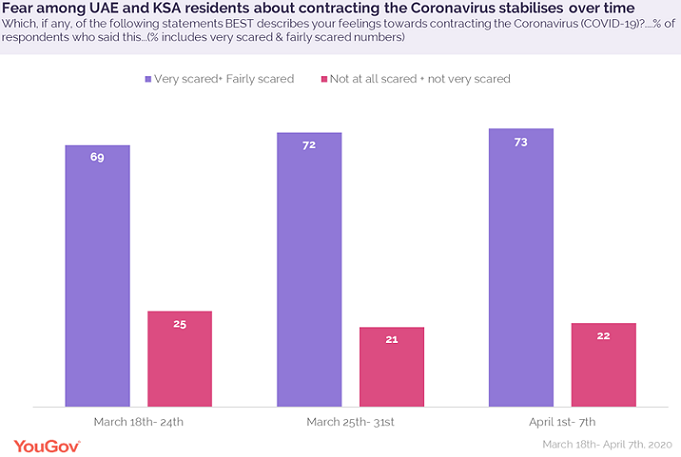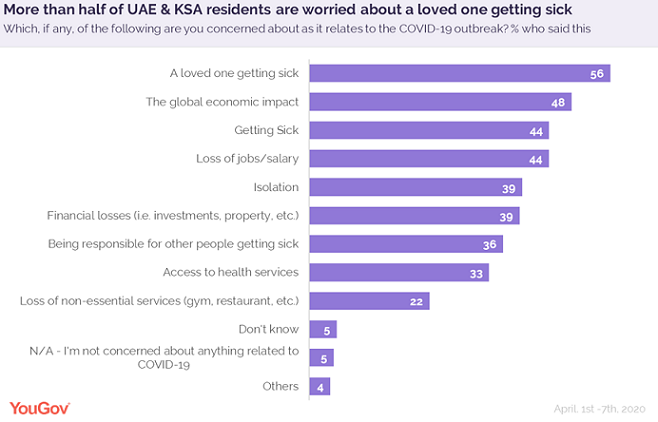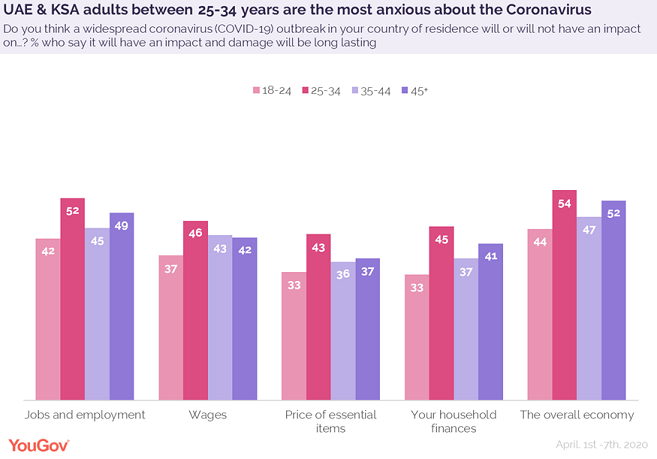 Although fear about personally contracting the virus has stabilised over time, worry about a loved one getting sick is a top concern among residents
Although fear about personally contracting the virus has stabilised over time, worry about a loved one getting sick is a top concern among residents
With an uptick in the number of infected cases, governments in the UAE and Saudi Arabia have extended lockdowns and curfews in many cities in order to contain the Coronavirus outbreak.
As people are settling at home and practising social distancing, data from YouGov’s ongoing COVID-19 monitor shows fear among people is stabilising over time and this week again we saw no change in the number of people who said they are very or fairly scared about contracting the Coronavirus (from 72% to 73%). The proportion of people saying they are not very or not at all scared is also stable- at 22%.
The data shows that more than half of the residents in UAE and KSA (56%) are worried about a loved one catching the Coronavirus infection. The concern is higher among women as compared to men (60% vs 53%) as well as residents married with children than singles (60% vs 48%).
Many worry about getting someone else sick (36%). Close to half of the respondents in both the countries are concerned about the global economic impact of the virus (48%) and 44% are anxious about losing their job or salary.
Two in five fear isolation or financial loss (39% each), and one third worry about access to health services (33%). Slightly more than one in five (22%) are concerned about missing out on non-essential services while one in twenty (5%) are not worried about anything related to COVID-19.
For most of these options, young adults between 18-24 years seem to be the least anxious while those aged 45+ appear to be the most concerned.
When it comes to the likely impact of the Coronavirus outbreak, roughly half the respondents in UAE and KSA think the pandemic will have a long-term impact on jobs and employment (48%) as well as the overall economy (50%).
Compared to people in KSA, residents in the UAE were much more likely to say the virus will harm the job market and spur unemployment for a long time (55% vs 40%), as well as cause long-lasting damage to the overall economy (56% vs 44%). On the other hand, KSA residents were more likely to believe the impact in both these areas will be short-term.
The public in both the countries is expecting short-term negative impact on the price of essential items (46%) and household finances (42%). But when it comes to their wages people are equally divided, with 43% saying the virus will affect their wages in the long haul while 42% reckon the harm will be short-lived.
Young adults aged between 25-34 years seem to be the most anxious about the likely impact of the virus and are more likely to envision a long-term damage in all these areas as compared to the other age groups.
Data collected online by YouGov Omnibus among 2001 respondents in the UAE and Saudi Arabia between 1st and 8th April 2020 using YouGov’s panel of over 6 million people worldwide. Data is representative of the adult national population in each country.


